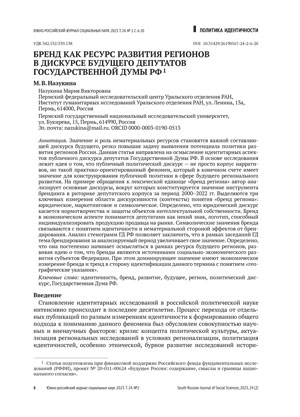Abstract
The importance and role of intangible resources are becoming an important component of the discourse of the future, dramatically increasing the task of identifying the potential of the development policy of the regions of Russia. This article is aimed at understanding the identitarian aspects of the public discourse of deputies of the State Duma of the Russian Federation. The research is based on the idea that public political discourse is not just a body of narratives, but a practice–oriented phenomenon that ultimately has significance for the construction of public policy in the field of future regional development. Using the example of referring to the lexical unit “brand of the region”, the author analyzes the main discourses around which the importance of the branding tool in the rhetoric of the deputy corps for the period 2000–2022 is constituted. There are three key dimensions of the field of discursivity (contexts) of the concept of “brand of the region”: legal, marketing and symbolic. It is determined that the legal discourse concerns rulemaking and protection of intellectual property objects. The brand in the economic aspect is understood by the deputies as a kind of sign, a logo capable of individualizing the seller’s products on the market. The symbolic meanings of the brand are associated with the concept of identity and the intangible side of branding effects. The analysis of the transcripts of the State Duma of the Russian Federation allows us to conclude that within the framework of the meetings of the State Duma, the topic of branding for the analyzed period gradually increases its importance. It is determined that it is gradually beginning to be comprehended within the framework of the resource of the future of the regions, developing the idea that brands are sources of socio-economic development of the subjects of the federation. At the same time, the economic dimension of the brand and the trend towards the identification of this term with the concept of “geographical indications” are of dominant importance.
Keywords
Acknowledgements
The research was supported within the grant provided by the Russian Foundation for Basic Research (RFBR), project no. 20-011-00624 “Russia’s future: content, rationale and boundaries of national consent”.
References
- Anholt, S. (2006). The Anholt City Brands Index: How the World Views Its Cities. Place Branding, 2, 18–31.
- Fadeeva, L.A., Nazukina, M.V. (2020). Institutsionalizatsiya politicheskoy nauki v Rossii: faktory, urovni, rezul’taty (na primere identitarnykh issledovaniy) [Institutionalization of Political Science in Russia: Factors, Levels, Results (in the Example of Identity Studies)]. Politicheskaya nauka [Political Science], 1, 201–202. DOI: 10.31249/poln/2020.01.08
- Fedotova, N.G. (2015). Territorial’naya identichnost’ kak simvolicheskiy resurs regiona [Territorial Identity as a Symbolic Resource of Region]. Vestnik Novgorodskogo gosudarstvennogo universiteta [Vestnik NovSU. Issue: Liberal Sciences], 7, 105–108.
- Kalashnikova, S.K. (2022). Kriterii otsenki effektivnosti simvolicheskoy politiki v kontekste izucheniya praktik regional’noy politiki identichnosti [Criteria for Assessing the Effectiveness of Symbolic Policy in The Context of The Study of Regional Identity Policy Practices]. Yuzhno-rossiiskii zhurnal social’nykh nauk [South-Russian Journal of Social Sciences], 3, 33–47. DOI: 10.31429/26190567-23-3-33-47
- Kotler, F., & Rein, I., & Haider, D. (2005). Marketing gorodov. Privlecheniye investitsiy, predpriyatiy, zhiteley i turistov v goroda, kommuny, regiony i strany Yevropy [Marketing Places Europe. How to Attract Investments, Industries, Residents and Visitors to Cities, Communities, Regions and Nations in Europe]. SPb: “Stokgol’mskaya shkola ekonomiki”.
- Kulakov, S.V. (2019). Territorial’nyy brending kak instrument formirovaniya pozitivnoy regional’noy politicheskoy identichnosti [Territorial Branding as a Tool for Formation of Positive Regional Political Identity]. PolitBook [Politbook], 2, 101–115.
- Morozova, E.V., Philippov, D.Ye. (2021). Politika identichnosti na lokal’nom urovne (na primere goroda Yeyska) [Identity Policy at Local Level (The City of Yeysk Case)]. Kaspiyskiy region: politika, ekonomika, kultura [The Caspian Region: Politics, Economics, Culture], 4(69), 91–97. DOI: 10.21672/1818-510X-2021-69-4-091-097
- Morozova, E.V., Miroshnichenko, I.V., Semenenko, I.S. (2020). Razvitiye sel’skikh mestnykh soobshchestv: potentsial politiki identichnosti [Identity Policies in Rural Local Community Development in Russia]. Polis. Politicheskie issledovaniya [Polis. Political Studies], 3, 56–77.
- Nazukina, M.V., Sulimov, K.A. (2021). K izmereniyu obraza budushchego v diskurse deputatov Gosudarstvennoy Dumy (na primere territorial’no-politicheskikh predstavleniy). [On Measuring the Image of the Future in the Discourse of the Russian State Duma Deputies (as Based on Territorial-political Representations)]. Ars Administrandi. [Ars Administrandi], 1, 1–18, DOI: 10.17072/2218-9173-2021-1-1-18
- Nazukina, M.V. (2022). Regionalizm v “poslaniyakh” glav sub’’yektov RF: diskursivnyy aspekt [Regionalism in the “messages” of the Heads of Subjects of the Russian Federation: A Discursive Perspective]. Polis. Politicheskie issledovaniya [Polis. Political Studies], 2, 68–82. DOI: 10.17976/jpps/2022.02.06
- Paasi, A. (2002). Place and Region: Regional Worlds and Words. Progress in Human Geography, 6, 475–485.
- Panov, P.V., Sulimov, K.A. (2023). Ideologicheskaya “garmoniya” v Gosudarstvennoy dume: vozniknoveniye, soderzhaniye, granitsy [Ideological “harmony” in the State Duma: Emergence, Content, Boundaries]. Politicheskaya nauka [Political Science], 1, 61–91. DOI: 10.31249/poln/2023.01.03
- Semenenko, I.S. (2017). Politika identichnosti: Menyayushchayasya povestka dnya [Identity Politics: A Changing Agenda]. In O.Yu. Malinova Simvolicheskaya politika [Symbolic politics], (21–41). Moskva: INION RAN.
- Semenenko, I.S. (2021). Diskursy razvitiya v sotsial’nykh naukakh: v preddverii eticheskogo povorota [Rethinking Development in Social Sciences: on the Threshold of an Ethical Turn]. Polis. Politicheskie issledovaniya [Polis. Political Studies], 2, 25–45. DOI: 10.17976/jpps/2021.02.03
- Vizgalov, D.V. (2011). Brending goroda [Branding of the City]. Moskva: Fond Institut ekonomiki goroda.
 Русский
Русский


